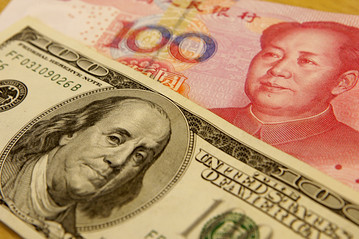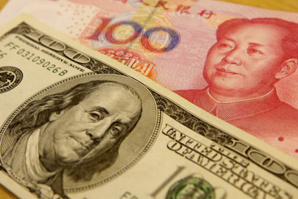This country has pegged its currency to the dollar mostly to improve financial stability. Dollar rises against most currencies around the world in anticipation of the Fed's rate hikes, and renminbi follows it. China suffers more as slower growth of its economy is almost double dependent on trade.
"This is a problem, - said Yukon Huang, a senior fellow at the Carnegie Endowment for International Peace in Washington and a former World Bank director for China. - It's bad when there is excessive strengthening, while the economy is collapsing."
That's why he and other economists, including former US Treasury Secretary Lawrence Summers, expect China to try to weaken the renminbi-dollar ties and allow the currency to devalue.
"They're at an impasse - said Huang. - If they devalue the currency, they will fall under attack." Nevertheless, "they should do so."
US presidential candidate from the Republican Party Donald Trump called China "the offender of US №1" and accused the country of "mindless manipulation" of its currency.
Of course, the US economy was affected by the dollar’s increase since mid-2014 (more than 20% against the basket of currencies during that time and about 3% against renminbi). The stronger dollar has made American companies less competitive on world markets by lowering exports by 4.3% in the first 10 months of this year.
Yet, China faces even greater difficulties because of the strengthening currency. Revenues from trading amounted to 42% of GDP last year, compared with 23% for the US.
The dollar’s sudden rise by 10% slowed down growth in China by 1 percentage point, which almost doubled the impact from the United States’ side, according to a computer simulation developed by economists of Goldman Sachs.
Renminbi has risen by 15% against the basket of currencies since mid-2014. The rise came at the time when China is losing competitiveness in countries such as Vietnam and Thailand due to the high cost of labor.
Over the past 10 years, renminbi’s increase by 26% against the dollar was the second after the Swiss franc grew by 31% among the major currencies. The result of the recent increase in the national currency triggered the economic slowdown. In III quarter, GDP grew by 6.9% compared with the same period a year earlier. This is the worst figure since the beginning of 2009, as weaker production and exports have shifted to the service of sector and consumption.
A stronger currency is undermining China’s efforts to prevent deflation, as it puts pressure on import prices. Prices of Chinese manufacturers fell by 5.9% in October compared to the same period a year earlier. This was the 44th consecutive monthly decline.
China will continue to face deflationary pressures, particularly in the manufacturing sector if renminbi continues to rise in price along with the dollar, said Xiao Gang, professor at the University of Hong Kong. Nevertheless, he hopes that China would avoid devaluation out of fear that such a move would upset quite fragile domestic financial markets.
Another reason to keep renminbi stable against the US dollar - Chinese companies increasing dollar-denominated debt. Cheap renminbi will make servicing these obligations more stringent.
If China sticks to the current exchange rate regime, it must be ready for further growth of renminbi together with the dollar.
source: bloomberg.com
"This is a problem, - said Yukon Huang, a senior fellow at the Carnegie Endowment for International Peace in Washington and a former World Bank director for China. - It's bad when there is excessive strengthening, while the economy is collapsing."
That's why he and other economists, including former US Treasury Secretary Lawrence Summers, expect China to try to weaken the renminbi-dollar ties and allow the currency to devalue.
"They're at an impasse - said Huang. - If they devalue the currency, they will fall under attack." Nevertheless, "they should do so."
US presidential candidate from the Republican Party Donald Trump called China "the offender of US №1" and accused the country of "mindless manipulation" of its currency.
Of course, the US economy was affected by the dollar’s increase since mid-2014 (more than 20% against the basket of currencies during that time and about 3% against renminbi). The stronger dollar has made American companies less competitive on world markets by lowering exports by 4.3% in the first 10 months of this year.
Yet, China faces even greater difficulties because of the strengthening currency. Revenues from trading amounted to 42% of GDP last year, compared with 23% for the US.
The dollar’s sudden rise by 10% slowed down growth in China by 1 percentage point, which almost doubled the impact from the United States’ side, according to a computer simulation developed by economists of Goldman Sachs.
Renminbi has risen by 15% against the basket of currencies since mid-2014. The rise came at the time when China is losing competitiveness in countries such as Vietnam and Thailand due to the high cost of labor.
Over the past 10 years, renminbi’s increase by 26% against the dollar was the second after the Swiss franc grew by 31% among the major currencies. The result of the recent increase in the national currency triggered the economic slowdown. In III quarter, GDP grew by 6.9% compared with the same period a year earlier. This is the worst figure since the beginning of 2009, as weaker production and exports have shifted to the service of sector and consumption.
A stronger currency is undermining China’s efforts to prevent deflation, as it puts pressure on import prices. Prices of Chinese manufacturers fell by 5.9% in October compared to the same period a year earlier. This was the 44th consecutive monthly decline.
China will continue to face deflationary pressures, particularly in the manufacturing sector if renminbi continues to rise in price along with the dollar, said Xiao Gang, professor at the University of Hong Kong. Nevertheless, he hopes that China would avoid devaluation out of fear that such a move would upset quite fragile domestic financial markets.
Another reason to keep renminbi stable against the US dollar - Chinese companies increasing dollar-denominated debt. Cheap renminbi will make servicing these obligations more stringent.
If China sticks to the current exchange rate regime, it must be ready for further growth of renminbi together with the dollar.
source: bloomberg.com






